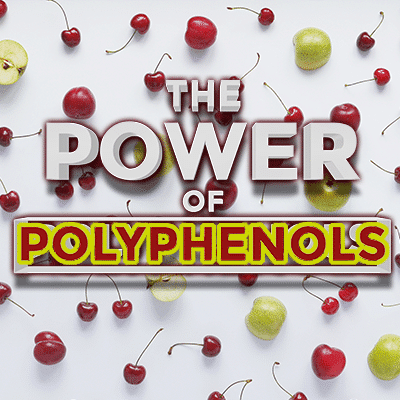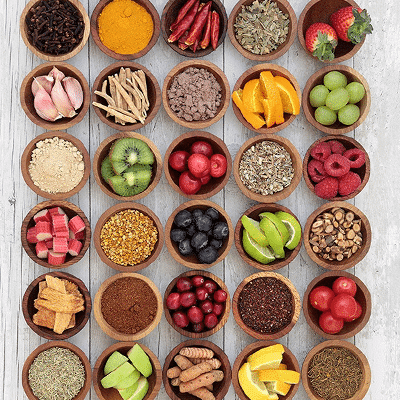The Power of Polyphenols – Improve Digestion, Fight Aging and Reduce Disease
You may have heard of polyphenols because they are often touted as being great for your health.  And they are! These phytochemicals (chemicals found in plants) are packed with healing antioxidants. This class of molecules are able to stop damaging oxidation processes within your body. Oxidation leads to inflammation, aging, and ultimately, disease. In fact, polyphenols should be an integral part of everyone’s plan for improved health. Without antioxidants, oxidation causes free radicals to course throughout your body pulling electrons off of other molecules and causing you harm. Free radicals are especially concerning because they can set off a chain reaction, causing damage to your cells to run rampant. When you eat foods high in polyphenols, you can reduce these reactions and can even reverse inflammatory pathways. Adding more polyphenols to your diet is relatively easy and great for your overall health. Do you know all the benefits of polyphenols? Are you getting enough polyphenols in your diet? You might be surprised at just how powerful they can be.
And they are! These phytochemicals (chemicals found in plants) are packed with healing antioxidants. This class of molecules are able to stop damaging oxidation processes within your body. Oxidation leads to inflammation, aging, and ultimately, disease. In fact, polyphenols should be an integral part of everyone’s plan for improved health. Without antioxidants, oxidation causes free radicals to course throughout your body pulling electrons off of other molecules and causing you harm. Free radicals are especially concerning because they can set off a chain reaction, causing damage to your cells to run rampant. When you eat foods high in polyphenols, you can reduce these reactions and can even reverse inflammatory pathways. Adding more polyphenols to your diet is relatively easy and great for your overall health. Do you know all the benefits of polyphenols? Are you getting enough polyphenols in your diet? You might be surprised at just how powerful they can be.
Types of Polyphenols
Thousands of individual polyphenols have been identified, but they break down into four major groups based on the number of phenol rings present.
- Flavonoids – These polyphenols have anti-inflammatory and antioxidant properties. They are the most common form of polyphenols and found in nearly all fruits and vegetables. There are over 6,000 types of flavonoids and are largely responsible for bright colors. Things like berries, citrus, and tea are notoriously high in flavonoids.
- Phenolic acids – Phenolic acids have been studied in their effects against cancer and heart disease. These polyphenols are found in tea, coffee, cherries, kiwi, mangos, and more.
- Lignans – Found in legumes, flax seeds, grains, fruits, and vegetables, lignans are great for your immune system, hormone balance, and have even been studied for their breast cancer fighting effects.
- Stilbenes – These are a less common form of polyphenols. The most famous stilbene is resveratrol, which is found in grapes and red wine.
Each of these four types of polyphenols carry slightly different benefits and are found in a variety of foods. One thing if for sure, we could all use a little more polyphenols in our lives.
The Amazing Benefits of Polyphenols
Polyphenols pack a serious punch when it comes to how they benefit your health. Studies have found polyphenols to be associated with a number of specific health benefits, including improving:
- Gut health – Studies have found that polyphenols positively impact the composition of the gut microbiome, which is the home of your immune system.
- Heart health – Polyphenols promote good cardiovascular health through reducing the risk of disease.
- Signs of aging – Well known for their anti-aging properties, studies have found that polyphenols actually limit the effects of aging on a cellular level.
- Weight management – Studies have linked polyphenols to an improvement in weight management, which could be due to the improvement in the gut microbiome composition.
- Blood sugar regulation – Science has found that high polyphenol foods are great for maintaining glucose homeostasis. This is especially good news for any who is prediabetic or has diabetes.
- Oxidative stress – Oxidative stress is caused when there are too many reactive oxygen species and not enough protective factors, which turns on inflammatory pathways. Polyphenols have been found to not only reduce inflammation but inhibit these pathways, which stops the vicious cycle.
- Fighting neurodegenerative disorders – Polyphenols are protective against neurodegeneration and related diseases. This is why doctors often recommend polyphenols to patients with early signs of cognitive decline.
- Fighting cancer cells – Polyphenols fight cancer cells through reducing inflammation but also through various cellular mechanisms. Studies have found that polyphenols can interrupt enzymes, and interact with nucleic acids, nucleoproteins, and intracellular receptors to fight cancer growth.
With such a wide range of benefits, why wouldn’t you eat more polyphenols? The sheer abundance of polyphenols means it’s relatively easy to get more in your diet – Plus, there are supplement forms as well.
Where Can You Find Polyphenols?
Polyphenols are found in so many foods we associate with good health, including:
 Flax seeds
Flax seeds- Chestnuts
- Olive oil
- Tea
- Coffee
- Berries
- Cacao
- Spinach
- Plums
- Apples
- Cherries
- Black beans
- Hazelnuts
- Artichokes
There are also many spices that are very high in beneficial polyphenols, including:
- Peppermint
- Cloves
- Spearmint
- Oregano
- Celery seed
- Sage
- Rosemary
- Thyme
Since polyphenols are often responsible for rich colors, you can sometimes guess if a food is high in polyphenols if they have a dark color (such as plums and berries). When you incorporate more of these into your diet, you’ll experience the benefit of polyphenols.
Quebracho the Little-Known Source of Polyphenols
Quebracho Colorado is an excellent source of the world’s most stable polyphenol. The water-soluble tannins (a type of polyphenol) in quebracho has made it of particular interest in the world of natural medicine. Tannins have a higher molecular weight than polyphenols because they are polymers of flavonoid units (think clusters). These large molecules aren’t easily digested and for a long time scientists thought they carried little benefit. We now know, that much like fiber, these large polyphenols clusters are beneficial precisely because they aren’t absorbed but remain in the gastrointestinal tract longer. They have been observed to be beneficial in fighting microbial infections, cancer, and in scavagening damaging free radicals. Quebracho Colorado is currently only found in Atrantil, a botanical treatment for bloating and digestive issues.
Are You Getting Enough Polyphenols?
The science is out there – polyphenols are great for your health. If you want to improve your digestion, reduce risk of disease, and fight aging, be sure you’re adding more of these bad boys to your life. Your body will thank you! https://www.ncbi.nlm.nih.gov/pubmed/24552647 https://www.ncbi.nlm.nih.gov/pubmed/24869971 https://www.ncbi.nlm.nih.gov/pubmed/10370866 https://www.ncbi.nlm.nih.gov/pubmed/23849454 https://www.ncbi.nlm.nih.gov/pubmed/24077237 https://www.ncbi.nlm.nih.gov/pubmed/24172301 https://www.ncbi.nlm.nih.gov/pmc/articles/PMC4728631/ https://www.ncbi.nlm.nih.gov/pmc/articles/PMC5055983/ https://www.ncbi.nlm.nih.gov/pubmed/22336470 https://www.ncbi.nlm.nih.gov/pubmed/17551696 https://www.ncbi.nlm.nih.gov/pubmed/9759559